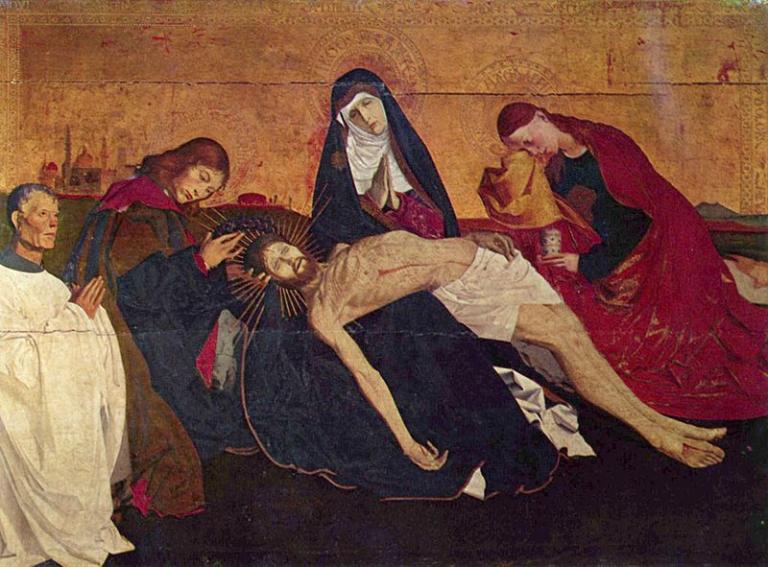There are all kinds of prosperity gospel preaching today. There is the name it and claim it orientation that says “God wants you to be rich and famous. Just believe!” Another kind, a very different kind of prosperity gospel, is the one that instead of naming and claiming it goes, “They will see his face, and his name will be on their foreheads” (Revelation 22:4; ESV). Instead of salvation being about our naming and claiming ‘it’, our salvation is that Jesus claims and names us!
Such naming and claiming does come with a price tag, though—the precious blood of the Lamb. The fact that we bear his ‘brand’ name means that we are branded, too: “And they have conquered him by the blood of the Lamb and by the word of their testimony, for they loved not their lives even unto death” (Revelation 12:11; ESV).
Unlike those forms of prosperity gospel that replace discomfort and suffering with pleasure and immediate victory, the kind of prosperity and victory the book of Revelation talks about involves a great deal of discomfort and suffering. But it is worth it, for as Jesus says, “The one who conquers (other translations: “overcomes” {NASB} “is victorious” {NIV}), I will grant him to sit with me on my throne, as I also conquered and sat down with my Father on his throne” (Revelation 3:21; ESV).
True prosperity is participating in Jesus’ life and reigning with him—the conquering Lion of the Tribe of Judah who is the Lamb that was slain (Revelation 5:5-6), and experiencing the Marriage Supper of the Lamb (Revelation 19:6-10).
All too often, prosperity gospel preaching can focus on what’s in it for ‘me.’ So, too, those who have endured a great deal of suffering can focus on how to get even for what’s been done to ‘me.’ Certainly, Revelation affirms the martyrs who cry out to God to “avenge” their blood (Revelation 6:9-11). Still, they do not take matters into their hands, but look to God. Vengeance belongs to the Lord who will make right and whole (Romans 12:19). However, unlike those who would turn inward and pity themselves, the church that is filled with the Spirit turns outward in view of the victory that is theirs in Christ: “The Spirit and the Bride say, ‘Come.’ And let the one who hears say, ‘Come.’ And let the one who is thirsty come; let the one who desires take the water of life without price” (Revelation 22:17; ESV).
The suffering and victorious church is missional. The church or bride of Christ does not turn inward toward herself to lick her wounds. Rather, she turns outward toward the world to provide cleansing water and healing balm and to invite others in to participate with her in Jesus’ victorious life.
One of the greatest examples of such vibrant missional witness is when the early church endured the plague of Cyprian along with countless others in the Roman Empire. While city officials offered up sacrifices to their pagan deities in the face of various plagues like this one, they did not care for the dying, but abandoned them. The Christians stood in the gap given their view that everyone is created in the image of God, that our Lord is incarnate, and that we are embodied souls that who will be resurrected, just as Jesus was raised bodily from the dead. The Christians, though a persecuted religious minority, arose to provide voluntary health care for the sick and dying, even though they risked sickness and death, too, as a result of the plague. However, they knew their eternal destiny was secure. And although they cared for their fellow humans at great risk to themselves, the persecution of the church did not wane, but intensified. “When the plague of Cyprian struck in 250 and lasted for years, this volunteer corps became the only organization in Roman cities that cared for the dying and buried the dead. Ironically, as the church dramatically increased its care, the Roman government began persecuting the church more heavily.” (Refer here for this quote and an interview with Oregon State University historian Gary Ferngren on the subject).
These early Christians did not name and claim wealth or health, but sickness and death in the here and now for eternal rewards that far outweighed their present state of suffering. They did not love their lives so much as to shrink from death for the sake of others. Rather, they conquered by the blood of the Lamb and the word of their testimony. They belonged to the suffering, victorious and missional church throughout the ages that through the Spirit of Jesus welcomes all people to drink of the water of life without price: “Come!”














